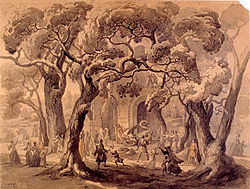Clement of Metz
| Saint Clement of Metz | |
|---|---|

Saint Clement, first bishop of Metz, near ruins of the amphitheater. By Auguste Migette (ca. 1850).
|
|
| Bishop | |
| Venerated in |
Eastern Orthodox Church Roman Catholic Church |
| Feast | November 23rd |
Saint Clement of Metz (Latin: Clemens de Metiae; French: Clément de Metz) is venerated as the first Bishop of Metz. According to tradition, he was sent by Saint Peter to Metz during the 1st century, with two disciples: Celestius (Céleste de Metz) and Felix (Felix de Metz), who are listed as his successors in that see. However, this legend may have been constructed much later to lend more antiquity to the episcopal see, and to make the diocese of Metz appear to be more ancient than it actually was. As Hippolyte Delehaye writes, "To have lived amongst the Saviour's immediate following was...honorable...and accordingly old patrons of churches were identified with certain persons in the gospels or who were supposed to have had some part of Christ's life on earth." Elaboration of this legend states that Clement was the uncle of Pope Clement I.
Clement may have actually arrived at Metz at the end of the 3rd century, though the first fully authenticated bishop, however, is Sperus or Hesperus, who was bishop in 535.
Clement of Metz, like many other saints, is the hero of a legend in which he is the vanquisher of a local dragon. In the legend of Saint Clement it is called the Graoully or Graouilly. The legend states that the Graoully, along with countless other snakes, inhabited the local Roman amphitheater. The snakes’ breath had so poisoned the area that the inhabitants of the town were effectively trapped in the town. After converting the local inhabitants to Christianity after they agreed to do so in return for ridding them of the dragon, Clement went into the amphitheater and quickly made the sign of the cross after the snakes attacked him. They immediately were tamed by this. Clement led the Graoully to the edge of the Seille, and ordered him to disappear into a place where there were no men or beasts. Orius did not convert to Christianity after Clement tamed the dragon. However, when the king’s daughter died, Clement brought her back from the dead, thereby resulting in the king’s conversion.
...
Wikipedia
